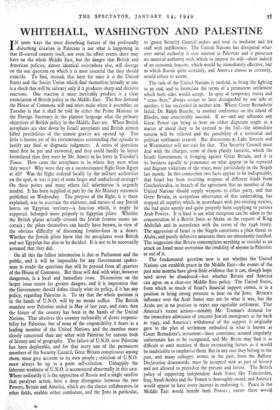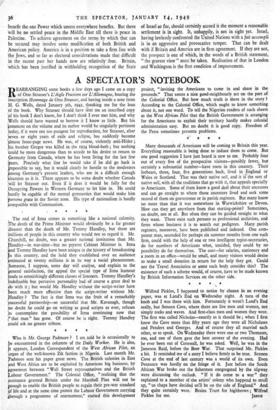WHITEHALL, WASHINGTON AND PALESTINE
IN some ways the most disturbing feature of the profoundly disturbing situation in Palestine is not what is happening in that ill-starred country itself, nor even the effect events there may have on the whole Middle East, but the danger that British and American policies, almost identical everywhere else, will diverge on the one question on which it is most essential that they should coincide. To find, instead, that here for once it is the United States and the Soviet Union which find themselves broadly at one is a shock that will be salutary only if it produces sharp and decisive reactions. One reaction it must inevitably produce is a clear enunciation of British policy in the Middle East. The first demand the House of Commons will and must make when it assembles on Tuesday is that it shall be told by either the Prime Minister or the Foreign Secretary in the plainest language what the primary objectives of British policy in the Middle East are. When British aeroplanes are shot down by Israeli aeroplanes and British airmen killed possibilities of the utmost gravity are opened up. Too little is known yet of the circumstances surrounding that episode to justify any final or dogmatic judgement. A series of questions must first be put and answered, and they could hardly be better formulated than they were by Mr. Amery in his letter in Tuesday's Times. How came the aeroplanes to be where they were when they were? Why were they on a reconnaissance flight from Egypt at all? Was the flight ordered locally by the military authorities on the spot, or was it part of some larger and undisclosed strategy? On these points and many others full information is urgently needed. It has been supplied in part by the Air Ministry statement published on Wednesday. The purpose of the flight, it is there explained, was to ascertain the existence and nature of any Jewish forces on Egyptian territory—a function which, it might be supposed, belonged more properly to Egyptian pilots. Whether the British planes actually crossed the Jewish frontier seems un- certain ; the pilots themselves can hardly have known, in view of the obvious difficulty of discerning frontier-lines in a desert. Whether the Jewish pilots knew that the aeroplanes were British and not Egyptian has also to be decided. It is not to be necessarily assumed that they did.
On all this the fullest information is due to Parliament and the public, and it will be impossible for any Government spokes- man to evade the questions that will be pressed from all quarters of the House of Commons. But these will deal with what, however dangerous, is a local and immediate issue. Dissensions on the larger issue create far greater dangers, and it is imperative that the Government should define clearly what its policy, if it has any policy, regarding Palestine is. To say that the whole question is in the hands of U.N.O. will by no means suffice. The British mandate over Palestine ended in May of last year, and since then the future of the country has been in the hands of the United Nations. That absolves this country technically of direct responsi- bility for Palestine, but of none of the responsibility it bears as a leading member of the United Nations, and the member more closely concerned than any other with Palestine for reasons both of history and of geography. The failure of U.N.O. over Palestine has been deplorable, and for that every one of the permanent members of the Security Council, Great Britain conspicuous among them, must give account to its own people ; criticism of U.N.O. must always be up to a point self-criticism. Unhappily the inherent weakness of U.N.O. is accentuated abnormally in this case. Where ordinarily it is the opposition of Russia and a single satellite that paralyses action, here a deep divergence between the two Powers, Britain and America, which are the closest collaborators in other fields, enables either combatant, and the Jews in particular, to ignore Security Council orders and treat its mediator and his staff with indifference. The United Nations has dissipated what- ever moral authority it ever exerted in Palestine and it possesses no material authority with which to impose its will—short indeed of an economic boycott, which would be immediately effective, but' to which Russia quite certainly, and America almost as certainly, would refuse to assent.
The task of the United Nations is twofold, to bring the fighting' to an end, and to formulate the terms of a permanent settlement which both sides would accept. In spite of temporary truces and " cease fires," always sooner or later disregarded by one side or another, it has succeeded in neither aim. Where Count Bernadotte failed, Dr. Ralph Bunche, in another conference on the island of Rhodes, may conceivably succeed. If so—and any influence any Great Power can bring to bear on either disputant ought as a matter of moral duty to be exerted to the full—the immediate tension will be relieved and the possibility of a territorial and political settlement created. But discussions at Lake Success and at Westminster will not wait for that. The Security Council must deal with the charges, some of them plainly fantastic, which the Israeli Government is bringing against Great Britain, and it is its business equally to pronounce on what appear to be repeated and flagrant violations of the truce, most particularly in the Negeb last month. In this connection two facts appear to be indisputable, that Israel has been receiving weapons of different kinds from Czechoslovakia, in breach of the agreement that no member of the United Nations should supply weapons to either party, and that Great Britain, in scrupulous observance of that undertaking, has stopped all supplies which, in accordance with pre-existing treaties, she had quite openly and quite properly been supplying to ;rations Arab Powers. It is hard to see what exception can be taken to the concentration of a British force at Akaba on the request of King Abdullah and in accordance with the terms of the 1946 treaty.
The aggression of Israel in the Negeb constitutes a plain threat to Akaba, and purely defensive measures there are abundantly justified.
The suggestion that Britain contemplates anything so suicidal as an attack on Israel must overstrain the credulity of anyone in Palestine or out of it.
The fundamental question now is not whether the United Nations can establish peace in the Middle East—the events of the past nine months have given little evidence that it can, though hope need never be abandoned—but whether Britain and America can agree on a clear-cut Middle East policy. The United States, from which so much of Israel's financial support comes, is in a position to bring strong pressure to bear on the Jews. Britain's influence over the Arab States may not be what it was, but the Arabs are in no position to reject any equitable settlement. That America's recent actions—notably Mr. Truman's demand for the immediate admission of roo,000 Jewish immigrants as far back as 1945, and America's withdrawal of the support it originally gave to the plan of settlement embodied in what is known as Count Bernadotte's testament—have sometimes seemed singularly unfortunate has to be recognised, and Mr. Bevin may find it as difficult to omit mention of these extenuating factors as it would be inadvisable to emphasise them. But in any case they belong to the past, and many unhappy events in the past, from the Balfour Declaration downwards, must be accepted now as part of history and not allowed to prejudice the present and future. The British policy -of supporting independent Arab States like Transjordan, Iraq, Saudi Arabia and the Yemen is thoroughly sound, and America. would appear to have every interest in endorsing it. Peace in the Middle East would benefit both Powers ; unrest there would benefit the one Power which unrest everywhere benefits. But there Will be no settled peace in the Middle East till there is peace in Palestine. To achieve agreement on the terms by which that can be secured may involve some modification of both British and American policy. America is in a position to take a firm line with The Jews, and so far as electoral considerations made that difficult in the recent past her hands now are relatively'. ree. Britain, 'which has been justified in withholding recognition of the State of Israel so far, should certainly accord it the moment a reasonable settlement is in sight. It, unhappily, is not in sight yet. Israel, having lawlessly confronted the United Nations with a fait accompli is in an aggressive and provocative temper. That can be dealt with if Britain and America are in firm agreement. If they are not, the prospect is one of which, in the words of a British statement, " the gravest view " must be taken. Realisation of that in London and Washington is the first condition of improvement.



































 Previous page
Previous page